Human Anti-E-Cadherin / CD324 Antibody Product Attributes
Species: Human
Tested Applications: Immunohistochemistry (IHC).
Clonality: Monoclonal
Anti-E-Cadherin / CD324 Antibody Clone: SPM381
Clone SPM381 Host and Isotype: Mouse IgG1 kappa
Anti-Human E-Cadherin / CD324 Positive Control Sample: LS174T, Raji, HT29, SK-BR3 cells. Prostate or Colon carcinomas.
Cellular Localization of Antibody Cell Surface
Buffer and Stabilizer: 10mM PBS with 0.05% BSA and 0.05% Azide
Antibody Concentration: 200 ug/ml
Antibody Purification Method:Protein A/G Purified
Immunogen: Recombinant human full-length E-Cadherin protein
Storage Conditions: Store at 2 to 8° C (refrigerate). Stable for 24 months when properly stored.
E-Cadherin / CD324 Previously Observed Antibody Staining Patterns
Observed Subcellular, Organelle Specific Staining Data:
Anti-CDH1 antibody staining is expected to be primarily localized to the cell junctions, golgi apparatus and plasma membrane. There is variability in either the signal strength or the localization of signal in plasma membrane from cell to cell.Observed Antibody Staining Data By Tissue Type:
Variations in E-Cadherin / CD324 antibody staining intensity in immunohistochemistry on tissue sections are present across different anatomical locations. An intense signal was observed in cells in the tubules in kidney, epidermal cells in the skin, exocrine glandular cells in the pancreas, glandular cells in the appendix, breast, colon, duodenum, endometrium, epididymis, fallopian tube, gallbladder, parathyroid gland, prostate, rectum, salivary gland, seminal vesicle, small intestine, stomach and thyroid gland, keratinocytes in skin, Langerhans in skin, melanocytes in skin, pneumocytes in lung, respiratory epithelial cells in the nasopharynx, squamous epithelial cells in the cervix, uterine, esophagus, oral mucosa, tonsil and vagina, trophoblastic cells in the placenta and urothelial cells in the urinary bladder. More moderate antibody staining intensity was present in cells in the tubules in kidney, epidermal cells in the skin, exocrine glandular cells in the pancreas, glandular cells in the appendix, breast, colon, duodenum, endometrium, epididymis, fallopian tube, gallbladder, parathyroid gland, prostate, rectum, salivary gland, seminal vesicle, small intestine, stomach and thyroid gland, keratinocytes in skin, Langerhans in skin, melanocytes in skin, pneumocytes in lung, respiratory epithelial cells in the nasopharynx, squamous epithelial cells in the cervix, uterine, esophagus, oral mucosa, tonsil and vagina, trophoblastic cells in the placenta and urothelial cells in the urinary bladder. Low, but measureable presence of E-Cadherin / CD324 could be seen inmacrophages in lung. We were unable to detect E-Cadherin / CD324 in other tissues. Disease states, inflammation, and other physiological changes can have a substantial impact on antibody staining patterns. These measurements were all taken in tissues deemed normal or from patients without known disease.Observed Antibody Staining Data By Tissue Disease Status:
Tissues from cancer patients, for instance, have their own distinct pattern of E-Cadherin / CD324 expression as measured by anti-E-Cadherin / CD324 antibody immunohistochemical staining. The average level of expression by tumor is summarized in the table below. The variability row represents patient to patient variability in IHC staining.| Sample Type | breast cancer | carcinoid | cervical cancer | colorectal cancer | endometrial cancer | glioma | head and neck cancer | liver cancer | lung cancer | lymphoma | melanoma | ovarian cancer | pancreatic cancer | prostate cancer | renal cancer | skin cancer | stomach cancer | testicular cancer | thyroid cancer | urothelial cancer |
|---|---|---|---|---|---|---|---|---|---|---|---|---|---|---|---|---|---|---|---|---|
| Signal Intensity | +++ | ++ | +++ | +++ | +++ | - | ++ | ++ | ++ | - | ++ | +++ | +++ | +++ | - | ++ | +++ | ++ | +++ | +++ |
| CDH1 Variability | ++ | ++ | ++ | + | + | + | ++ | ++ | ++ | + | ++ | ++ | + | + | ++ | ++ | ++ | ++ | + | ++ |
Limitations and Warranty
enQuire Bio's E-Cadherin / CD324 Anti-Human Monoclonal is available for Research Use Only. This antibody is guaranteed to work for a period of two years when properly stored.

.jpg)

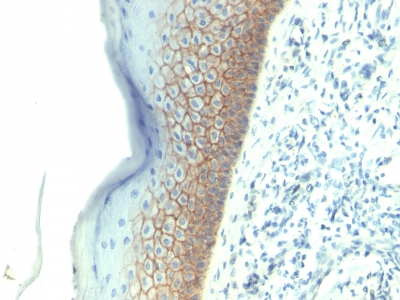

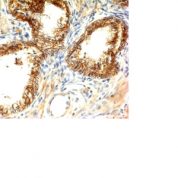
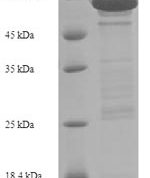
-178x178.jpg)
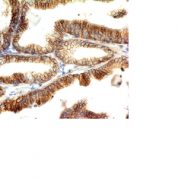
-178x178.jpg)
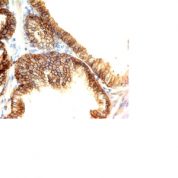
-178x178.jpg)
There are no reviews yet.